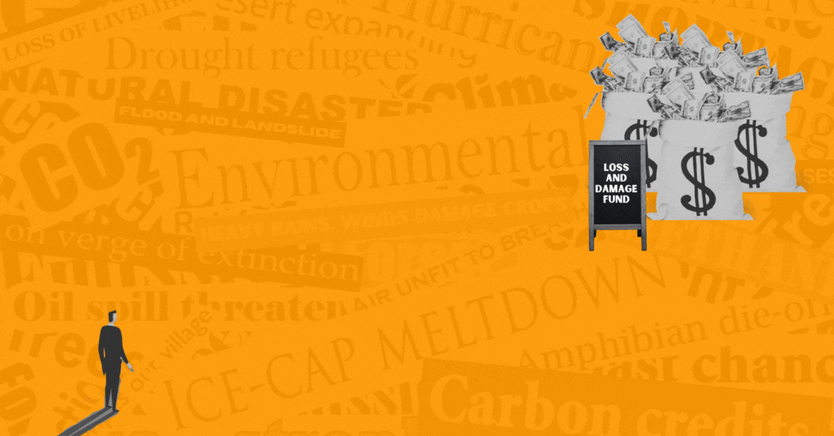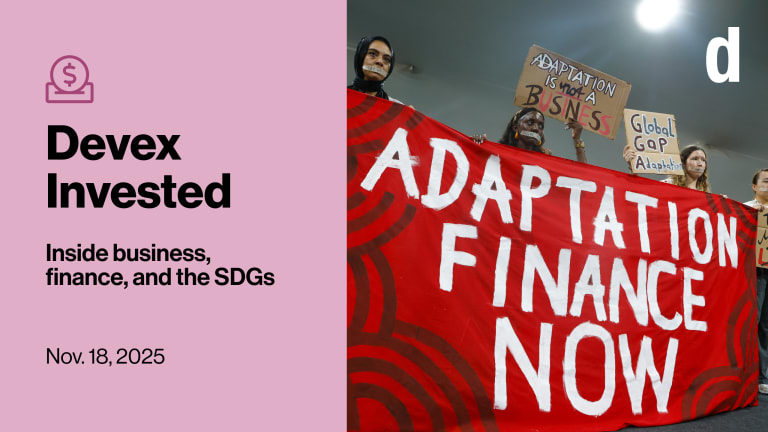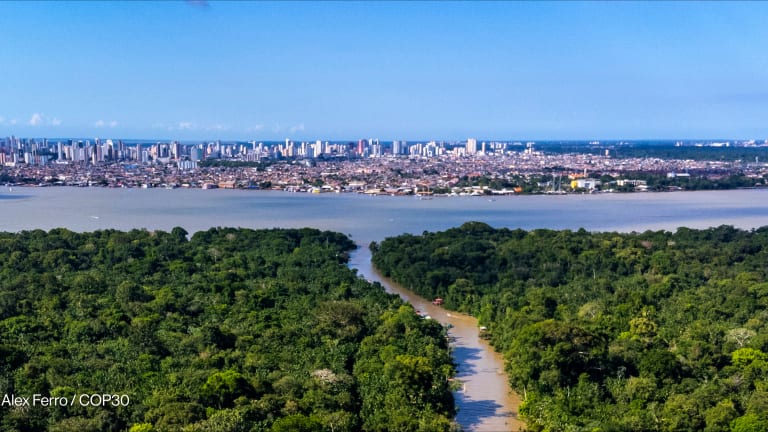
Today, we dig into the major climate issues that will take center stage at the 29th United Nations Climate Change Conference, or COP 29, which starts in November.
The summit will be the first since the creation of a fund that high-income countries say will help poorer countries grapple with climate change. Last month, the fund’s 26-member board was able to give an official name to the pot of money they’re administering: the Fund for Responding to Loss and Damage.
This seemingly trivial development was significant because, like many steps in the origins of the loss and damage fund, the christening was met with resistance. In this case, by the U.S., the world’s second-most polluting nation.
U.S. Special Presidential Envoy for Climate John Kerry repeatedly referred to it as the “fund for climate impact response” at last year’s United Nations Climate Change Conference, or COP 28, in Dubai. He avoided the three words everyone else used — loss and damage — perhaps for domestic political considerations or perhaps out of concern that it would concede liability for carbon emissions that damage the planet.
“Retaining those words at least communicates that the harm has been caused because of inaction,” Harjeet Singh, a political strategist at Climate Action Network International, tells Devex’s Michael Igoe.
Since the loss and damage fund was officially created at COP 28, its board members have met twice and laboriously ticked off a list of must-haves: a board (12 members from high-income countries and 14 from low- and middle-income countries), an institution to hold the money (The World Bank, amid controversy), a host country (the Philippines), initial funding ($660 million), and a job description for the fund’s executive director.
“We need somebody in that position who isn’t just a banker,” Brandon Wu, director of policy and campaigns at ActionAid USA, told Devex. “We need somebody who really understands climate change, understands loss and damage, understands the needs of developing countries.”
Now, they must find that executive director and presumably announce it at their third board meeting this September in Baku, Azerbaijan, which will also host the COP 29 summit in November.
That is the summit where member countries will negotiate a new collective quantified goal on climate finance, referred to by the initials NCQG. As Tais Gadea Lara reports for Devex: “Observers are concerned that if the NCQG results in an ambitious figure at COP 29, next year developed countries may not want to pledge billions to the loss and damage fund.”
Catch up on our coverage:
• What's in a name? US seeks to rebrand climate 'loss and damage' fund.
• World Bank ready to ‘break new ground’ to host loss and damage fund (Pro)
• New climate fund makes progress on a leader, but not on scale (Pro)
Below are other key points to come to grips with ahead of this year’s climate change conference.
New finance targets
Many observers consider COP 29 to be a “finance COP.” At the top of the agenda, as Devex contributor Chloé Farand reports, will be the negotiation over a new collective quantified goal, which will replace the $100 billion target high-income countries committed to deliver to lower-income ones every year by 2020.
The negotiation already faces obstacles. At the U.N. midyear climate change conference in Bonn, Germany, representatives from high-income countries attempted to expand the base so private banks and other countries including China — the world’s largest carbon-emitting nation — could also contribute. However, they did not specify their own financial commitments.
“We’ve taken modest steps forward here in Bonn,” Simon Stiell, head of the U.N. Framework Convention on Climate Change, said at the closing plenary. “But we took a detour on the road to Baku.”
Country representatives are also expected to submit their 2035 climate plans to limit global warming by 1.5 degrees Celsius. The U.N. Environment Programme warned last year that the world is on track to get hotter by 2.7 degrees Celsius by the end of the century.
Read: What will be on the COP 29 agenda? Here are 7 issues to watch (Pro)
See also: As UN warns of ‘detour’ midway to COP 29, where are climate talks at? (Pro)
Further reading: Lessons from the $100B target can shape the next climate finance goal (Pro)
+ Not a Devex Pro member yet? Access all our exclusive reporting and analysis by starting your 15-day free trial today.
As a Pro member, you’ll also get a discount to register for our Devex World 2024 summit in October and meet with high-level speakers and attendees including luminaries in the climate and development space.
Host busters
COP 29 will put a spotlight on host Azerbaijan. The oil-rich country of over 10 million people nestled between Russia and Iran has been a controversial choice.
It will be the second consecutive petro-state to host the climate conference after the United Arab Emirates last year, as well as the second consecutive host to appoint an oil executive as conference president — Mukhtar Babayev, ecology and natural resources minister, is a former executive with the state-owned oil company SOCAR. It’s also the third consecutive host with a poor human rights record — authorities in Egypt, which hosted the conference two years ago, crushed electoral political dissent.
Authorities in Azerbaijan have detained critics ahead of the summit, Devex’s Sara Jerving reports. Nearly 300 political prisoners and journalists are being held. Among them is Anar Mammadli, co-founder of the Climate of Justice Initiative, a group of activists criticizing the rise of greenhouse emissions and inequitable water distribution.
Human rights observers also say Azerbaijan officials are using the summit to greenwash the country’s recent territorial conflict with western neighbor Armenia. Azerbaijan claimed the mountainous Nagorno-Karabakh region last year, leading more than 100,000 ethnic Armenians to flee.
The Azerbaijan government has injected $3.1 billion into reconstruction projects in the region, and has encouraged the Azerbaijani population who had left in the 1990s to return.
“They’ll do anything to greenwash the fact that they ethnically cleanse that region,” Sheila Paylan, a human rights lawyer of Armenian descent, told Devex. “If there was an international conference on flowers, I’m sure they would plant flowers all over it.”
Read: Under Azerbaijan's repression, what's civil society's role at COP 29?
Plus: Azerbaijan’s gamble to rebrand a green Nagorno-Karabakh at COP 29
Local funding and local action
Many top development officials have said that climate action needs to be decided and taken in local communities. But as Andrew Green reports for Devex, the term “localization” has become an often misleading buzzword.
While many organizations have transferred some of their hiring and workforce to cities in the global south, their hierarchical mindset and worldview have remained.
The current climate finance architecture remains ill-equipped to get money directly into the hands of local organizations, Devex contributor Natalie Donback reports. Only 10% of climate finance committed from international climate funds is prioritized for local-level activities.
Barriers to local funding include funding models that center on large international intermediaries, lack of midsized grants, and complicated accreditation and application processes.
Devex, in Roots of Change, a series on locally led development, has highlighted stories of people who are taking climate action in their own communities.
In Vanuatu, an archipelago of 83 islands in the South Pacific and the world’s most vulnerable country to disasters, women are exercising leadership. They’re breaking with their society’s patriarchal structures, and training people in their communities on how to prepare and respond to cyclones, droughts, and floods.
Furthermore, on the banks of the Mekong River in Thailand, communities that relied on fishing and farming along the river have lost their livelihoods as a result of floods and dam construction. Now, some fishing communities are finding ways to adapt and protect the river.
Read more on localization:
• Why is so little climate finance going to local organizations?
• What does localization really mean? (Pro)
And explore the visual stories:
• Women are fighting climate change in the South Pacific, but need money
• How local groups are fighting to revive world's largest inland fishery
+ Localization is all the rage, but which locally led organizations are going beyond the buzzword? Next month we’ll be publishing a list of local organizations that show what’s possible with localization and we’d like your help! Send a note to hayley.mundeva@devex.com if you'd like to nominate your organization for consideration or you know of another that deserves to make it onto the list.
You may also share this message with your networks. Thank you and stay tuned next month for the results!
Interrogating climate finance
Many ideas commonly accepted about climate finance should be challenged, experts say.
Despite grassroots efforts, the financing needs for climate change in low- and middle-income countries are greater than previously thought. Those countries’ finance adaptation needs are now estimated at $194 billion to $366 billion per year, according to UNEP’s latest Adaptation Gap Report.
Small island countries such as Fiji are calling on funders to give them broader support and move away from funding that’s based on individual projects. And that funding should be channeled with new accountability mechanisms, Oluseun Onigbinde, global director of the BudgIT Foundation, writes in an opinion piece for Devex.
“Investing money into weak procurement systems woven around a culture of patronage cannot impact societies positively due to high levels of inefficiencies,” Onigbinde writes. “For climate financing to be fully optimal, it requires the interrogation of the fiscal systems of partner countries.”
At the Paris Peace Forum midyear conference in Ben Guerir, Morocco, in June, a panel of experts rejected the accepted tension between funding environmental sustainability versus developing the economies of African countries.
Mo Ibrahim, a Sudanese-born British entrepreneur and philanthropist, said high-income countries should assume greater responsibility for their contributions to the planet’s rising temperatures.
“I’m sorry to give a negative message, but guys, wake up,” he said. “We keep on having summits and meetings, but they’re not working.”
Read: At Paris Peace Forum, a dilemma of climate vs. development
Opinion: Deepen local voices for more climate finance accountability
Sign up to Newswire for an inside look at the biggest stories in global development.








